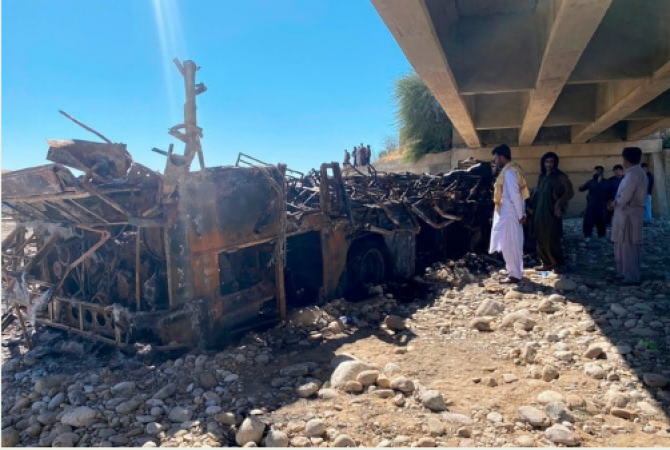
Karachi: On Sunday, at least 50 people died in two separate transport accidents in Pakistan, according to officials, reigniting a discussion about the lack of strict transportation safety regulations in the South Asian nation.
In the first incident, a passenger bus crashed into a ravine and caught fire in the Bela region of Pakistan's Balochistan province, where thousands of people die in traffic accidents every year.
With a staggering 40,000-km network of roads, Balochistan is Pakistan's largest but most impoverished province. It is a mountainous, desert region bordering Iran and Afghanistan.
Also Read: Boris Johnson: Putin made a missile attack threat against me saying he would kill me
In Balochistan province, accidents kill 6,000 to 8,000 people annually, mostly on notoriously dangerous single-lane roads known as "killer highways," according to the highway police.
According to Hamza Anjum Nadeem, the assistant commissioner for Bela, "a bus travelling from Quetta to Karachi plunged into a ravine and caught fire at around 3 a.m.," he told Arab News. "At least 39 bodies have been found, and searches are continuing for more."
Another passenger's death was later confirmed by Anjum, bringing the total to 40. Of these, 38 dead bodies were being transported to Karachi, a port city in southern Pakistan, 177 kilometres from Bela, for medical and legal formalities, according to Dr. Summaiya Syed, the police surgeon in Karachi.
The $64 billion China-Pakistan Economic Corridor, a plan to build roads and infrastructure, is centred in Balochistan and aims to eventually provide the shortest route for Chinese cargo travelling to the Middle East, Africa, and Central Asia.
Also Read: Calls for a shift in US police culture are renewed by the Tyre Nichols case
Under the CPEC, significant roads will be built, including the route from Balochistan's Khuzdar district to Gwadar, a deep-water port financed by China. But for now, thousands of people continue to perish on these roads every year due to the lack of dual carriageways, poor driver training, and highway patrols.
In a different incident, 10 kids perished when their boat capsized in the northwest of the nation, close to Kohat, in the Tanda Dam lake.
According to local police official Mir Rauf and the AFP news agency, all of the bodies that have been found so far were between the ages of 7 and 14. Six of the 11 kids who were pulled from the water, according to Rauf, are in a critical condition. When the boat capsized, it was transporting between 25 and 30 students who were on a day trip from a nearby madrassa.
Rauf declared that a rescue effort was in progress. When old and overloaded ships lose their stability and toss passengers into the water, mass drownings are common in Pakistan. When a crowded boat carrying a wedding party across the Indus river in Punjab province capsized in July, 18 women drowned.
Additionally, the South Asian nation's road safety regulations are weak, and thousands of people perish in traffic accidents every year, particularly in the province of Balochistan in the southwest.
According to the Asian Development Bank's National Road Safety Strategy 2018-2030, which used police statistics, 6,548 people passed away at the scene of an accident on Pakistani roads in 2016. There were 6,003 fatalities on provincial roads and 355 on national highways.
Also Read: Ukraine requests quicker weapon deliveries as Russia intensifies its eastern offensive
This month, a passenger bus collided with a truck in Balochistan's Killa Saifullah district, resulting in at least seven fatalities and 15 injuries. 22 people were killed in the same neighbourhood in June of last year when a passenger bus veered off a narrow road and fell into a ravine.